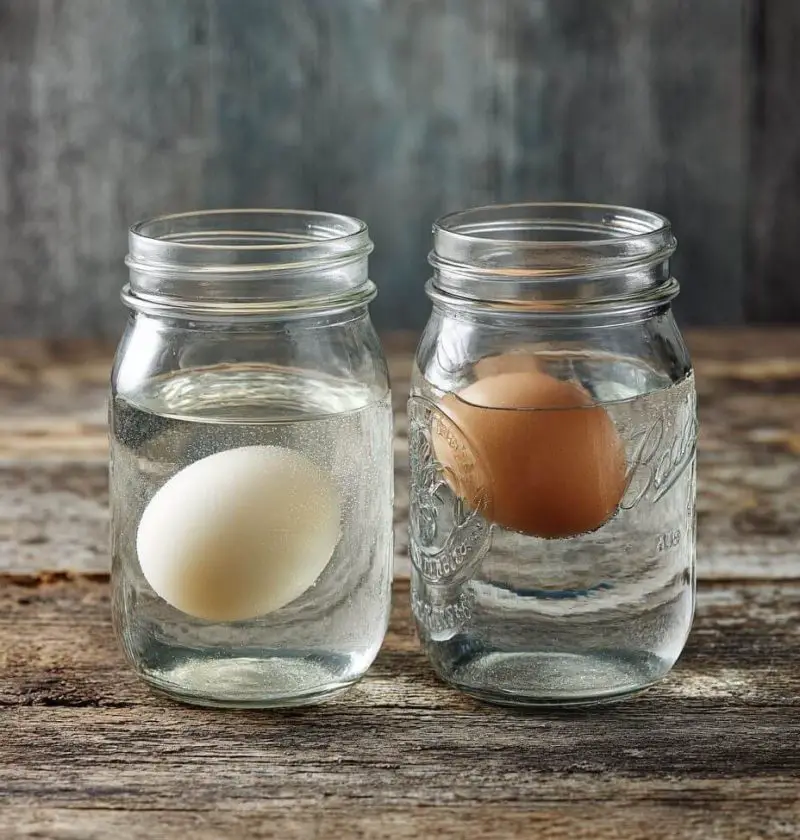Save This Recipe
I don’t know about you, but when I was growing up, there wasn’t a single thing that got past Nana’s kitchen radar. If something smelled a little funny, looked a little off, or just didn’t seem quite right—out it went. Waste not, want not… but food safety came first.
One of her most trusted kitchen tricks? Figuring out if an egg was still good without cracking it open. No sniff test, no flashlight—just a bowl of cold water and a moment of patience.
These days, with all the “use-by” and “sell-by” dates printed in tiny letters on every carton, folks forget that our elders had some solid home-tested methods long before barcodes and grocery apps. So today, I’m sharing one of Nana’s classics with you—the egg float test.
Why Bother Testing Eggs at All?
You might be thinking, “If the carton says they’re still good, isn’t that enough?” Well… not always.
Here’s the scoop: eggs can stay fresh for weeks past that printed date—if they’ve been stored properly. But they can also go bad faster if the fridge is too warm, or if the eggs have tiny cracks you didn’t notice. A bad egg can ruin your recipe and, worse, might give you a nasty case of food poisoning.
And if you’ve ever cracked a questionable egg right into your cookie dough? Oof. That smell doesn’t come out of your nose—or your batter—anytime soon.
So it’s worth a 30-second check, trust me.
Nana’s Egg Test: Simple, Sensible, and Still Spot-On
All you need is a bowl, some water, and an egg. That’s it. No science degree required.
Here’s how to do it:
-
Fill a bowl with cold water—enough to cover an egg completely.
-
Gently set the egg in the water.
-
Watch what it does.
And here’s what it means:
-
Sinks and lays on its side = Fresh as spring daisies. You’re good to go.
-
Sinks but stands upright = Still okay, but it’s getting older. Use soon—maybe in something cooked thoroughly, like a quiche or a casserole.
-
Floats to the top = Nope. That egg’s seen better days. Toss it, don’t trust it.
I’ve used this trick for decades, and it hasn’t let me down yet.
So… Why Does It Work?
Nana didn’t need a science lesson, but the reason behind this trick is actually pretty neat.
Eggshells are porous, which means air slowly sneaks in over time. The older the egg, the bigger that air pocket gets. That’s what makes it float—more air, less density. Fresh eggs are heavier, so they sink and lie flat. Simple physics, but pretty amazing when you think about it.
I like to imagine those little eggs aging like us—getting a little more buoyant with time, a little more upright, a little more… delicate. 😉
But Wait—What About All Those Other Egg Tests?
Oh yes, there are more, if you’re curious:
-
The Crack Test: Crack the egg into a bowl. Fresh ones have firm yolks and thick whites. Older ones look runny and kind of… sad.
-
The Shake Test: Shake it near your ear. If it sloshes, it’s old. (Personally, I never liked this one—too easy to drop.)
-
Candling: Holding a flashlight up to the egg to see inside. Cool for kids’ science fairs, but a little over-the-top for a Wednesday morning omelet.
Nana’s float test is just easier. No cleanup. No guesswork. No sloshing eggs across the kitchen.
Busting a Few Egg Myths While We’re Here
Let’s get a few things straight:
-
Cloudy egg whites mean it’s bad – Nope! That actually means it’s fresh. The cloudiness comes from carbon dioxide that hasn’t escaped yet.
-
Blood spots are gross and unsafe – Not true. They’re totally harmless. Just a natural hiccup in the laying process. Scoop it out if you want, or leave it.
-
If the egg’s cracked, it’s ruined – Depends. If it’s been sitting cracked in the fridge for days, toss it. But if it just cracked on the way home and still passes the float test? You’re probably fine.
Quick FAQ for the Curious Cooks
Q: How long do eggs actually last?
A: In the fridge, up to 5 weeks. Longer if they’re super fresh to begin with.
Q: Do I really need to refrigerate them?
A: In the U.S., yes. Our eggs are washed, which removes a protective coating.
Q: Can I use eggs past the expiration date?
A: Sure—if they pass the float test and smell fine once cracked.
Q: What should I do with floaters?
A: Toss them. It’s not worth the risk.
Final Thoughts from My Well-Worn Kitchen
I’ll be honest—sometimes I think we’ve forgotten how clever our grandmothers really were. Before apps and gadgets and digital timers, they relied on sight, smell, and good old-fashioned kitchen wisdom.
This egg trick? It’s one of those little gems that’s too useful to keep to ourselves.
So go ahead—next time you’re baking or whipping up some breakfast, give Nana’s float test a try. It might just save your recipe (and your appetite).
And if you’ve got a trick of your own that’s been passed down—whether it’s how to peel garlic without cursing or the best way to clean cast iron—send it my way. I’m all ears, buttered biscuits, and second helpings.

